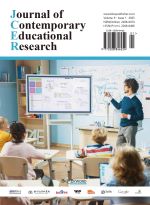Abstract
Rural education in China faces significant challenges, including limited resources, declining student enrollment, and frequent school closures. This paper examines the educational leadership and management strategies employed by Simin Primary School, a century-old rural institution in Zhuji City, which has successfully revitalized its community and attracted students through the innovative practice of nature education. By leveraging local cultural and environmental resources, the school has established a sustainable model for small rural schools.
References
Ni J, Li G, 2007, Nature, Worldview of Nature, Thoughts on Natural Education—An Evaluation of the Appropriateness of “Returning to Nature” in the New Curriculum Reform. Educational Research and Experiment, 2007(2): 26–31.
National Forestry and Grassland Administration, 2019, Notice on Fully Utilizing the Social Functions of Various Nature Conservation Areas and Vigorously Carrying Out Nature Education Work (Forestry Science Development Document [2019] No. 34), viewed January 5, 2025, http://lycy.hebei.gov.cn/showarticle.php?id=58707
Xinhua Net, 2021, The Congratulatory Letter to the 44th World Heritage Conference by President Xi Jinping, viewed January 5, 2025, http://www.xinhuanet.com/politics/leaders/2021-07/16/c_1127663629.htm
Wei Z, Zhao D, 2022, Research on High-Quality Development of Small-Scale Schools under the Background of Rural Education Revitalization. Teaching and Management, 2022(30): 54–57.
Lin H, Chen Z, 2021, Path Exploration of Urban-Rural Education Integration Development under the Background of Implementing the Strategy of Rural Revitalization. Pearl River Water Transport, (24): 48–50.
Uzun FV, Keles O, 2012, The Effects of Nature Education Project on the Environmental Awareness and Behavior. Procedia Social and Behavioral Sciences, 2012(46): 2912–2916.
Wang W, 2019, Strategies for the Development of Nature Education Extension Courses. Education, (21): 42–43.
Yang S, 2018, Analysis and Research on the Practice of Nature-Oriented Education, dissertation, Ningbo University.
Ybnu TM, Retnowati E, Dewi M, et al., 2024, Analysis of the Implementation of Training and Development Programs for Teachers in the Context of Curriculum Change: Evaluation and Recommendations. Dinasti International Journal of Education Management & Social Science, 5(6): 1868–1876.
Quattrini S, Merizzi A, Caciula I, et al., 2024, The Design and Implementation of a Novel Music-Based Curriculum for Dementia Care Professionals: The Experience of SOUND in Italy, Portugal and Romania. BMC Medical Education, 24(1): 668.
Lu J, 2022, Reform of Rural Schools under the Background of New Rural Community Construction. Journal of Mudanjiang Educational College, (12): 53–57.
Yao X, Xie W, 2021, Research on the Countermeasures to Improve the Education of Rural Left-Behind Children under the Background of Revitalization. Journal of Guizhou Normal University, 37(12): 40–44.
Zhou J, 2023, Hubei: Promoting the Construction of County-Level Educational Federations to Boost the High-Quality and Balanced Development of Urban and Ruralulsory Education. People’s Education, (24): 40–44.
Zhang R, 2020, The Problems Faced by Rural Education in the Internet Era and Solutions. Henan Agriculture, (36): 45–47.
